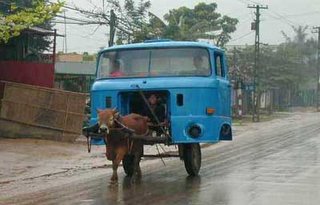
I am like many people that don’t have a large income and want to live in the least impacting way on this planet as possible. So you may ask, why I would argue that one should own “the bad boy” of personal transportation? The answer is simple, I think that this pickup truck may hold the answer to living very close to “oil free” at the most reasonable cost. Now you may think I have been sucking in excessive amounts of exhaust from these monsters and begun to hallucinate, but that is not the case at all, let me explain.
In the last few years there have been more car manufacturers producing electric and electric-hybrid cars. This is a positive step forward but it means that you basically have to buy a
NEW car because not many are in the used car market at this time. You may even have a hard time test-driving one because almost all US car dealers have a waiting list for new hybrid cars that are delivered. In some cases you may have to put down a $500 deposit just to get on the waiting list. When all is said and done hybrids still need gasoline, granted less but you still caught in the oil addiction cycle.
On the other hand, with fuel cost on the rise, used diesel pickups are easy to find and in some cases relatively inexpensive. In a search on autotrader.com I was able to find 20, 1997 to 1993 diesel pickups for sale within 50 miles of my home in western Idaho, in the price range of $6,000 to $10,000. I am sure that most people can find similar prices in their area if they do a little looking.
I know that $6,000 to $10,000 is a lot of money, however it is quite a bit less than the $23,000 to $32,000 charged for a new hybrid car or SUV. There are other money saving advantages to owning these pickups, the first is that most states have a flat tag fee for registering a vehicle that is more than 7 years old, in Idaho it is $35. Secondly, if you have a clean driving record, no DUI’s, and then the insurance can be less, especially if you don’t have to borrow money to purchase the pickup. Finally, diesel engines can last a very long time if properly maintained, you shouldn’t have to many engine worries with a pickup that has over 100,000 miles if you can get the service records when you buy one.
How can a diesel pickup be environmentally friendly and “oil-free”?I must first ask you a few things, if you can answer “yes” to all of them then you should keep reading, if not then I would recommend that you keep saving your money or you go buy the highest MPG car you can afford and wait till used hybrids are in a price range you can afford.
1. Do you have one day a week available that you are willing to spend towards oil independence?
2. Do you have $5,000 over a down payment on the pickup you can invest towards your oil independence?
3. Are you a creative problem solver, and don’t mind living outside conventional norms?
4. Would you like to have 70 cents a gallon vehicle fuel available all the time?
5. Do you have a garage or shed?
6. Would you like never having to take your auto in for an oil change again?
7. Would you like to be able to travel 1,000 miles and not have to stop for fuel?
8. (Optional) Do you have fuel oil heaters in your house, which are No. 2 diesel compatible?
9. (Optional) Would you like to have cheap fuel for a back-up generator for times of power blackouts?
BIODIESEL and GULF COST OIL FILTRATION SYSTEM
If you don’t know about biodiesel, then it is basically recycled fry grease from your favorite restaurant, such as Micky D’s or Bu’ger King. There are many good information sites on the web about biodiesel if you want more information. There are a few terms you will run across in your information search that you should be aware of that I will explain here.
- SVO (straight vegetable oil)- this is basically filtered fry grease or new vegetable oil that is used in autos and other things that use oil-base fuel. This is not what I am referring to in this article.
- B100- 100% high-grade refined vegetable oil, made from either used fry grease or new vegetable oil, used in diesel engines and other equipment that would normally use petroleum diesel. This is the fuel discussed in this article.
- B50- Mix of 50% B100 and 50% petroleum diesel fuel.
- B20- Mix of 20% B100 and 80% petroleum diesel fuel.
It is possible according to all the information I researched that any diesel car or truck made after 1990 can run on B100 without modifications to the engine, the only modification that I found mentioned for pre-1990 diesel engines is the replacement of the natural rubber fuel lines and o-rings. As I understand, vegetable based oils are corrosive to natural rubber, but don’t affect synthetic rubber.
Department of Energy has published studies that state:
"B100 is a less polluting alternative to petroleum diesel with greatly reduced greenhouse emissions and sulfates that cause acid rain."
The one big draw back to wide use of B100 is that it is hard to find and secondly, if you can find it at a local filling station it is often up to a dollar a gallon more than petroleum diesel. I am the kind of person that wants to do what is good for the planet but I also hate lining the pockets of big corporations. When I see the cost of B100 locally, I get the feeling that some big money interest is involved and I don’t want to put my hard earned dollars in their bank account.
With continued search I found a small company, I like small companies, Biodiesel Solutions that makes a B100 refining system you can set up in your garage. The basic system cost about $3,000 plus shipping, there are basic supply costs that you will have to get but for around $3,500 you can own your own B100 refinery.
According to Biodiesel Solutions, you can make a 40-gallon batch in about 12 hours with only 1 hour of hands-on time. I early mentioned that it would require about a day per week to declare your oil independence, I allotted a couple of hours spent picking up your fry grease from the restaurants.
Costs for making a gallon of B100, assuming that you are getting your fry grease for free, are about 70 cents per gallon for other supplies that you need. All the B100 made in this system can be used in any engine that uses No. 2 diesel, including heaters, generators, tractors, semi-trucks, buses and heavy equipment. The amount of cheap fuel you have available is only limited to the amount of fry grease you can collect.
For those if us that live in colder climates, you need to take extra steps in the winter to prevent B100 from gelling. In your pickup or equipment engines you can use a 50% mix or 20% mix with No. 1 winterized diesel. Having a heated garage would also be helpful, that is not too hard to solve visit the Clean Burn site for a shop heater that can use both used motor oil and B100. There is also a B100 anti-gel additive available (I have yet to find good source information) that can be used to prevent cold weather gelling problems.
You may have recognized that one is still not oil free with just running B100 in your fuel tank; the motor oil still needs changing. There is a company that sells oil filtration systems that are installed on diesel engines that allows you to never change your oil again, just the filters. After installation you will need to change the oil one time after the break-in period, but after that you only need to change the filters and add a little to top the system off.
These systems have been used by the US Army on tanks and by the navy in submarines. They have even been tested on over the road trucks. The test truck has been in service for 9 years and driven over a million miles with only two oil changes, the first for the break-in and the second for a ruptured oil pan gasket. This system doesn’t need special oil, just the regular oil that your equipment manufacturer recommends and Gulf Coast Filters. These systems cost between $900 and $2,800 for semi-trucks and heavy equipment.
To complete this rig, install a 50-gallon bed fuel tank that connects directly to the fuel system. These fuel tanks cost about $900 plus installation or you can install it yourself for free.
This fuel tank addition will give your pickup about a 1,000-mile travel distance when you have all your tanks full, provided that your pickup has fuel mileage of about 10 to 12 MPG. Most rural commuters would be able to go two weeks to a month on this amount of travel distance.
There you have it, an alternative powered vehicle that cost about 7-cents per mile to operate, and needs very little petroleum product input, that costs less then a new hybrid car. You also gain the added advantage of being able to pull a boat or camper or if you are looking for a little extra cash, hire out to friends and family to haul their big loads on the weekend.
It sure is something to think about.




